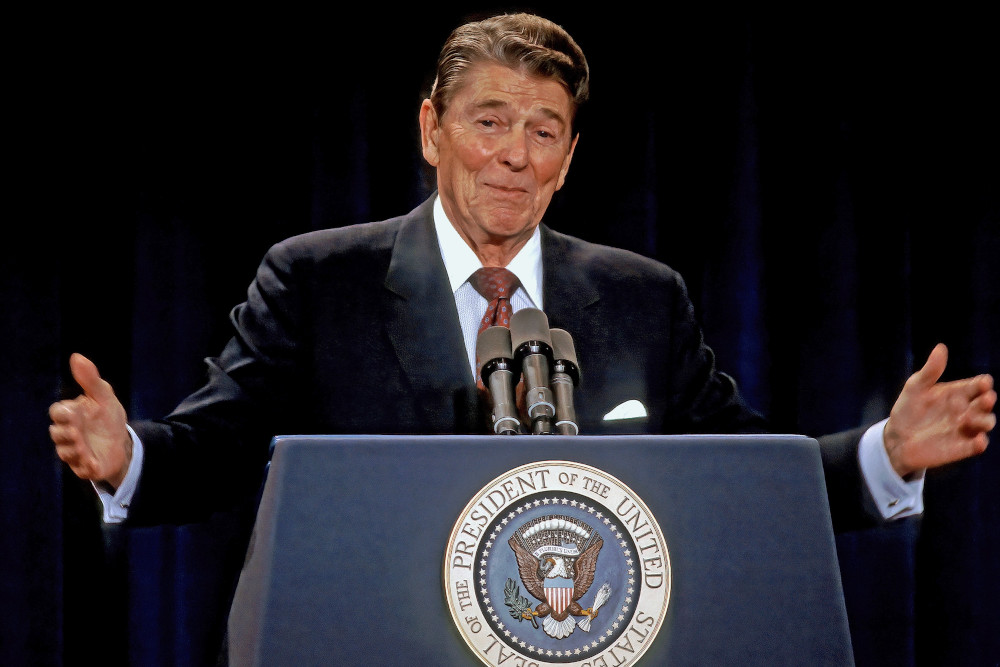Cao Changqing is a freelance writer based in New York. Born and raised in China, he draws on his experience as an immigrant adapting to a new culture and language to share thoughtful reflections on politics and society, seen through the eyes of someone raised under a communist regime.
In Part I and Part II, I explored the first two qualities that defined Ronald Reagan’s leadership: wisdom that brought clarity, and moral courage to stand firm against tyranny. In this final installment, I turn to the last two traits that shaped his legacy — his joyful spirit of optimism and humor, and his great capacity to love.
The joyful spirit of optimism and humor
Beyond wisdom and courage, Reagan’s third defining quality was his joyful spirit — an outlook of optimism, humor, and childlike clarity. Even his critics admitted he carried a smile as naturally as he wore a suit. He looked at life — and America — with steady joy.
That optimism stayed with him to the end. After he was diagnosed with Alzheimer’s, Reagan wrote a farewell letter to the nation. He spoke of beginning the sunset of his life but promised that “for America, it will always be a bright dawn ahead.” He often described the United States as “a shining city upon a hill,” a beacon of hope for people living without freedom.
Lee Edwards, a scholar at the Heritage Foundation, compared Reagan’s time to Roosevelt’s. He said the first half of the 20th century belonged to Roosevelt, who led America out of the Great Depression and World War II. The second half, he argued, was “the Age of Reagan,” as Reagan helped the country recover from years of division and defeat. After the assassinations of JFK and Martin Luther King Jr., the Vietnam War, and Watergate, America was weary and cynical. Reagan’s optimism helped restore confidence.
Where Roosevelt expanded government to solve problems, Reagan turned to the people. One of his most famous lines captured that belief: “Government is not the solution to our problem. Government is the problem.” The two parties differed not just in policy, but in how they saw the nation itself. With a wry smile, Reagan once said: “Republicans see every day as the Fourth of July. Democrats see every day as April 15th — Tax Day.”

Only someone truly optimistic could sustain humor like that. Reagan’s wit was legendary. Even at his funeral, from presidents to his children, those who loved him shared his stories and turned tears into laughter. Humor is a powerful bridge. It breaks down barriers and helps people connect.
Even in a country that values free expression, real humor is rare. But Reagan made it part of his life. He kept a notebook of jokes and stories to use in speeches and conversations. His optimism wasn’t just personal. He wanted everyone to feel it.
Some of his best lines were replayed after he died. During a presidential debate at age 73, he was asked about his age. He answered with a straight face: “I will not exploit, for political purposes, my opponent’s youth and inexperience.” Even his rival Walter Mondale burst out laughing.
Reagan often poked fun at himself. Speaking in a fifteenth-century hall in England, he joked: “How comforting to be among things older than I am. My election was America’s way of showing our European cousins we, too, respect antiques.”
After he was shot and rushed into surgery, Reagan looked up at the doctors and said: “I hope you’re all Republicans.” One of them answered: “Mr. President, today, we’re all Republicans.”
He loved telling stories. One of his favorites was about two campers fleeing a bear. One stopped to put on running shoes. His friend gasped: “You think you can outrun the bear?” The first replied: “I don’t have to outrun the bear — I just have to outrun you.”
Former Speaker Newt Gingrich said Reagan’s optimism and humor gave him a unique gift for connection. “Just as every basketball player dreams of being Michael Jordan,” he said, “every conservative dreams of being Reagan.” But Reagan’s charm couldn’t be copied. It wasn’t just style. It came from who he was.
Some on the Left liked to call Reagan “simple-minded.” But they never understood him. His simplicity wasn’t a flaw. It was his strength. He divided the world into good and evil and had little patience for gray areas. He believed good could win if people had the courage to act.
Reagan loved to read, but he never put on the airs of an intellectual. As his speechwriter Peggy Noonan recalled: “Reagan didn’t dislike intellectuals. Many of his heroes were thinkers — from the Founding Fathers to Milton Friedman, Hayek, and Solzhenitsyn. What he disliked was the intellectual class of his day — people he saw as clever pessimists who were long on opinions but short on wisdom.”

He often quoted George Orwell: “There are some ideas so foolish that only intellectuals would believe them.”
His daughter Patti, who once rejected her father’s politics but later embraced conservative values, said: “He was wise — not in the way intellectuals define wisdom, but in the wisdom rooted in faith. Faith simplifies. It brings clarity to the heart. His best decisions came when he followed the guidance of his heart.”
A great capacity to love
In addition to wisdom, courage, and his joyful spirit of optimism and humor, Reagan’s fourth great quality was love.
People often say love is only part of a man’s life, but the whole of a woman’s. For Ronald Reagan, love was everything. “Love is my heart,” he once wrote. And what is life without a heart?
His first marriage ended because his Hollywood wife could not accept his growing passion for politics. But his second marriage became the foundation of a beautiful and meaningful life. I remember reading I Love You, Ronnie — a collection of love letters edited by Nancy — in the library. Reagan was known for crafting memorable lines in his speeches. But his love letters were even more moving. They showed the heart of a man who believed love was the greatest force in life.
He wrote to Nancy:
“A man can’t live without a heart — and you are my heart.”
“We are so much a part of each other. You’re as essential as my own heartbeat — but unlike my heart, you could never be replaced by an artificial one.”
“I’ve been blessed with a Valentine life. It’s either that, or no life at all.”
On their 25th anniversary, he gave her a pair of gloves with a note:
“I hope these warm your hands as you have warmed my heart these past 25 years.”
“Your gift to me is beyond insurance — no appraiser could price it. Who can measure the anticipation I feel coming home to you? Or the way my step quickens when I first see you? Even an ordinary morning feels warm because you are near. Without you, this house is just an empty place.”
His love showed in countless small gestures. When he was too busy to ask Nancy directly, he would quietly reach out to her friends to learn what gifts might delight her. Sometimes they had to ask Nancy themselves, and the surprise would be spoiled. But she always played along, her joy no less real. It was their own version of The Gift of the Magi — love expressed in simple devotion.
The media often called Nancy controlling. But they missed the truth. She wasn’t interfering — she was protecting him. She let her own reputation take the blame so his wouldn’t. While Reagan focused on defeating communism and reducing the size of government, Nancy took care of everything he overlooked, even the names of his own staff. He could stay carefree because she carried the burdens. Though she seemed the smaller figure, her steady love helped shape the legacy we remember today.

A great wife was the best gift God gave Reagan. In return, he left his greatest gift to her.
In his final years, as Alzheimer’s took his memory, Reagan forgot almost everyone. For the last five days of his life, his eyes stayed closed. But at the moment of death, he opened them and looked directly at Nancy. His daughter Patti said: “His eyes weren’t clouded or distant — but clear and blue, full of love.” Nancy believed in that moment that he knew exactly who she was. That last look was his parting gift.
His son Michael said: “My father’s last glance on this earth was toward Nancy. His next was toward God.”
At his funeral, the pastor said God surely greeted him with the words: “Well done, good and faithful servant.”
Today, Reagan rests on a hill at the Reagan Presidential Library, looking out over the Pacific. Every morning, the sun rises over the land of freedom he loved.
Ronald Reagan’s life wasn’t marked by legendary drama, but it was beautiful — and it was great. To think of him is to remember wisdom, courage, humor, and tender strength. It is to remember faith and laughter, and the enduring American spirit that lifts us toward that shining city upon a hill.
Ronnie, from all those who love freedom: we remember you — and we always will.
Translated by Katy Liu, edited by Tatiana Denning
Follow us on X, Facebook, or Pinterest

